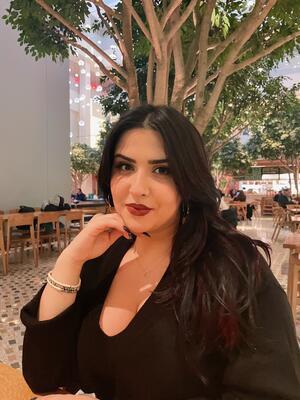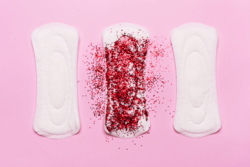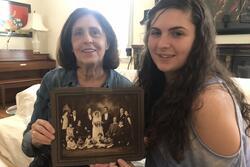7 Questions For Gender Justice Coordinator Ariella Davidov
JWA chats with Ariella Davidov, Gender Justice Coordinator at the Office of the Queens Borough President in New York City.
JWA: Can you tell us about your Jewish background?
Ariella Davidov: I grew up in an incredibly tight-knit cultural community in Queens where there is a large population of Sephardic and Mizrahi [Jews] and Jews from the former Soviet Union. I am first-gen Bukharian Jewish, and my parents came to the US as refugees from Uzbekistan in the 1990s, after religious and ethnic tensions came to a dangerous peak. Our lineage connects us to various regions in Central Asia, from Dushanbe to Tashkent, and our home was an interesting mix of Persian, Russian, and Jewish culture.
JWA: What would you like people to know about the Bukharian Jewish community?
AD: I would love to see the broader Jewish community learn more about Jews from Central Asia, explore our similarities and differences, and engage with our culture. We’re often the minority within the minority, and our voices need to be elevated because our practices and language are in danger of being lost to time and forced migration.
JWA: How does your Jewishness influence your feminism?
AD: My Jewishness is inextricably informed by the experiences of my family and ancestors who lived as Dhimmis [non-Muslim subjects of the Ottoman Empire] in Central Asia and later had to suppress their identities under Soviet rule. Intergenerational trauma is real, but so is intergenerational wisdom, and my feminism directly reflects the way that my ancestors never abandoned their identities in the face of oppression, valued life above all else, and always kept their faith for a better world. Ironically, dominant Bukharian culture is also deeply patriarchal, so I feel a deep tension that pulls me to build a feminist practice that is also culturally informed and judgment-free.
JWA: What do you do as a Gender Justice Coordinator?
AD: In leading this portfolio, I work to address gender equity issues and elevate the lives of women and survivors of gender-based violence. I’ve organized a trauma-informed self-defense workshop series, reproductive health workshops, resource fairs, training for front-line domestic violence workers, a professional women’s brunch, rallies in support of reproductive rights, a period product drive to fight menstrual poverty, and more. I work closely with service providers in order to connect survivors with much needed support, serve as a liaison between community-based providers and city agencies, and work on a Violence Against Women Act grant, which aims to improve the criminal justice response to gender-based violence.
JWA: Can you talk about the issue of period poverty across the borough of Queens?
AD: In order to promote equity, we have to start with ensuring that people have access to the essentials. There is nothing shameful about periods, and yet the price of period products makes comfortable and dignified periods feel like a luxury. The reality is that when people cannot access period products, they rely on makeshift items that may be unsanitary and unsafe to use. Women and girls in New York City are already more likely to live in poverty [than men] and [when they can’t afford] period products, are more likely to miss school or work. I am really proud to say that we have been able to donate hundreds of products to over a dozen schools, shelters, and pantries around Queens.
JWA: What other gender issues are important to the residents of Queens?
AD: The affordable housing crisis remains one of the biggest challenges for survivors fleeing unsafe situations or rebuilding their lives. Housing is bewilderingly inaccessible in NYC, from rent-hikes to high brokers' fees and salary requirements. We still hear too often that survivors [of gender-based violence] experience discrimination at the hands of landlords and fear disclosing their status, despite having legal protections against discrimination. It's a huge issue.
JWA: How can local governments help us feminists achieve our goals?
AD: It's really important for local governments to start with recognizing feminism as a valuable social tool that provides a lens and a framework to understand the issues that impact our communities in real time. With that understanding, it's also important to regularly engage with community stakeholders doing feminist work, whether they be activists promoting safer practices for sex workers or organizations providing support to survivors of domestic violence. The consistent outreach builds trust and ensures that these historically marginalized populations are always considered in decision-making and have the same access to government resources, like funding or institutional support.








My beautiful smart and very intelligent daughter
Sooo proud of her 💖💖
Very well says fabulous work , very talented person that I know 🥰🥰🥰🥰🥰